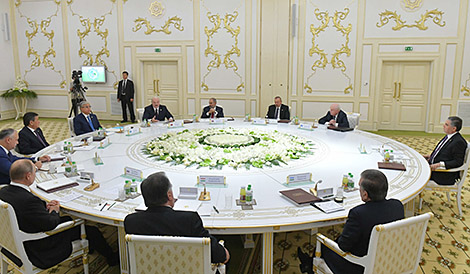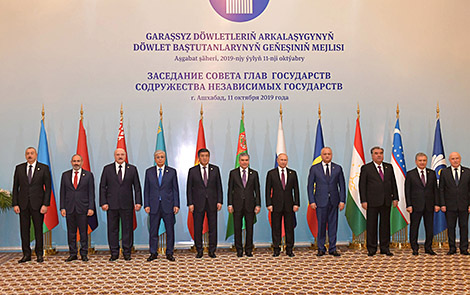Opinions & Interviews
CIS urged to support Belarus’ initiative on digital neighborhood belt

ASHGABAT, 11 October (BelTA) - Belarus President Aleksandr Lukashenko called to support Belarus’ initiative to develop the digital neighborhood belt at the CIS summit in Ashgabat on 11 October, BelTA has learned.
The president noted that security threats dominate the list of modern challenges to humanity and their number has been growing rapidly. One of the reasons is the progressive loss of trust in relations between the countries. “Today, more than ever, we need to find a unifying agenda, new ideas shared by a wide range of states and organizations,” Aleksandr Lukashenko believes.
The president called the problem of terrorism the most pressing, noting that no country in the world can cope with it alone. “The key to success lies in close coordination at all levels. Therefore, our program of cooperation between the CIS member states in the fight against terrorism and other violent manifestations of extremism is now very relevant," Aleksandr Lukashenko said. “It is very important. We cannot stop at this program. It should be deepened and expanded. Recently, new terrorist risks and threats have emerged. Cybercrime and cyber-terrorism are the greatest risks,” the president noted.
In this regard, the president recalled the recent drone attack in Saudi Arabia, noting that new weapons have become available to terrorists.
The head of state stressed that the internet and social platforms open unlimited opportunities for extremists to promote and recruit supporters and coordinate criminal activities. “Russia and China (should be given due credit) are doing a lot to shield against certain trends on the internet," the Belarusian leader said. “Why can't we join forces and somehow settle issues with regards to the internet? It is outrageous when terrorists promote their ideas in the open, instructing what to do and where. We need to think seriously about this,” the president noted.
 He recalled that Minsk hosted a high-level international conference on ways of countering terrorism through new and emerging technologies in September where Belarus had launched the "digital neighborhood belt" initiative. “As a mechanism of implementation we suggest signing agreements on information security, with key role being assigned to the idea of digital sovereignty and neutrality. This will guarantee non-interference of countries in the information resources of each other,” the Belarusian leader noted.
He recalled that Minsk hosted a high-level international conference on ways of countering terrorism through new and emerging technologies in September where Belarus had launched the "digital neighborhood belt" initiative. “As a mechanism of implementation we suggest signing agreements on information security, with key role being assigned to the idea of digital sovereignty and neutrality. This will guarantee non-interference of countries in the information resources of each other,” the Belarusian leader noted.
Aleksandr Lukashenko drew attention to the need to regulate relevant issues. “So-called hybrid wars and their component - information technology. We need to reach an agreement not to attack each other in the media and do not wage information wars against each other,” he said.
He asked the summit participants to support the Belarusian initiative in order to effectively counter terrorist and other threats in cyberspace. “If you agree, we could instruct the Executive Committee to start drafting the relevant agreement," Aleksandr Lukashenko added.








 print version
print version make home page
make home page add to bookmarks
add to bookmarks

